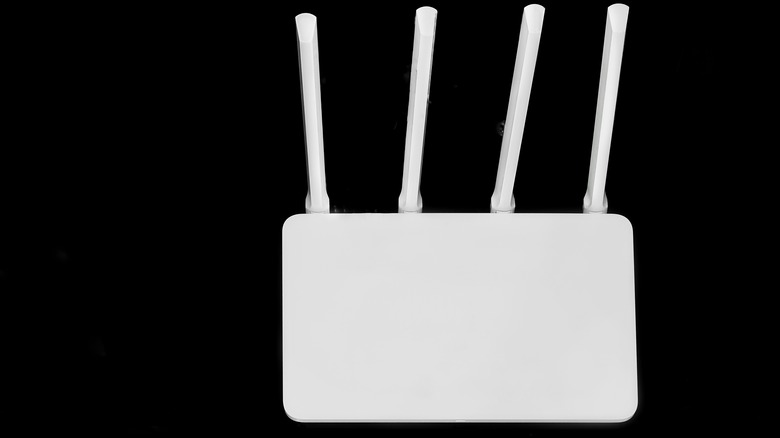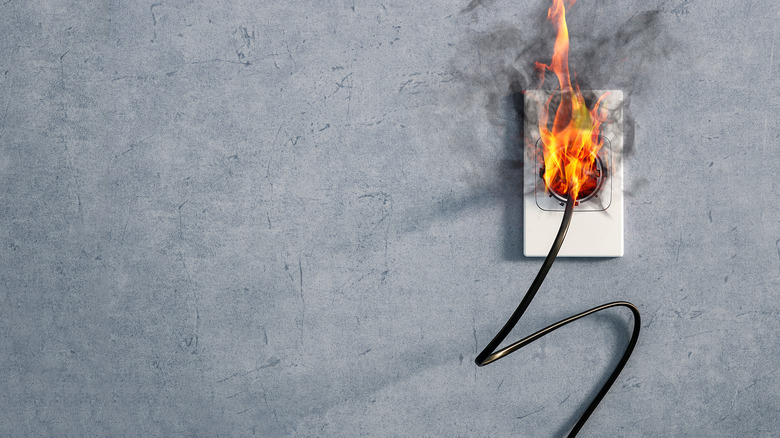Why You Should Turn Off Your Wi-Fi When Leaving Your House For An Extended Time
When leaving the house for an extended period, it's a good idea to turn off or unplug electronic devices that make your life easier. For example, if your water heater is run on a timer, pausing the control unit when you're away will help reduce energy usage and keep the property safer overall.
The same procedures should be kept for your TV, Amazon Alexa devices, and many other tools in your home. One electronic device often overlooked here is the wireless router, which provides the seamless connectivity that a modern household has come to rely on. But opting to leave it switched on – perhaps solely for an immediate reconnection once you walk through the door upon your return – can be a mistake for many reasons. Ask Leo! notes that leaving your router plugged in and functioning while away is acceptable, but only if you utilize its security features to keep your connection safe.
For most, the best course of action is to turn the Wi-Fi router off when leaving for a work-related trip or a holiday away. If your home will be empty for an extended period, turning off electrical equipment is always the best way to proceed. This means unplugging the connectivity equipment, too, for most people.
Security threats become magnified
For the average homeowner, digital security mainly concerns direct attacks: Phishing emails, aggressive pop-ups, or something similar. However, hackers and malicious actors can install all kinds of malware on your network if given enough time uninterrupted.
Criminals need two things to thrive — motive and access. Motive is often straightforward, but access may be harder to come by. When it comes to cybercriminals, leaving your wireless connection online while your house sits unoccupied gives them all the time they need to breach your network, especially if you have minimal defenses. It's possible to tell when someone is using your Wi-Fi, but it's much harder when you don't have direct access to your router.
Unplugging your router severs this connection, making it impossible for a cyber thief to access your network without gaining physical access to your devices. This ensures that your wireless network will remain uncompromised when you return home from work or adventures. While the threat of breach may be slight for many, criminal behavior is typically characterized by opportunity rather than any unique feature you (as the potential victim) bring to the table. Removing this opportunity will reduce the odds that you're targeted.
Surge protection adds a layer of fire risk reduction
In addition to the cyber defense that an unplugged router offers, Lifewire reports that unplugging your electronics, including your router, can help ward off the potential for electrical fires started by an unexpected power surge. While at home, you can handle the fallout in the unlikely event of a power surge. But if your home is left unattended, there will be no one there to manage the plugs in the event of a lightning storm directly overhead or any other type of electrical emergency that warrants action.
Dell notes that surge protection equipment can be built into electronic devices and that their primary function is to mitigate the damage caused by a sudden surge of electricity running through the equipment. Still, suppose you aren't at home to deal with a fried circuit. In that case, the damage could get much worse if you are unlucky enough to have a second lightning strike in the area or another electricity surge caused by a local infrastructure failure.
Real Homes reports that Wi-Fi devices don't pose the same level of fire risk that many other pieces of equipment that may reside in your home. Yet, the danger remains nonetheless, and the task of unplugging one additional box from the wall is as simple a job as any you'll complete during the final checks before leaving the house. The extra seconds required are negligible, but can enhance peace of mind while you're away.
You'll save money on your electricity bill
Finally, Real Homes suggests that the real issue solved by unplugging your Wi-Fi is the excess drain on your electricity usage. While most devices require minimal power from the wall when not in use (for instance, the TV or your PC), your router remains active while it's connected to power. The router always produces a signal that other devices can connect to, and they don't have sleep mode.
The price per kWh rose sharply in 2022 (via U.S. Bureau of Labor Statistics), and there's little hope of this changing any time soon. This means that homeowners should do all they can to reduce the electricity they use daily to protect their finances. Shutting down the Wi-Fi router while you're away for a week — or even just a few days — can make a small but meaningful impact on this front. For electricity usage, every little bit counts toward the goal of lowering usage and the resulting bill. Therefore, this simple act reduces electricity costs over the long term.



